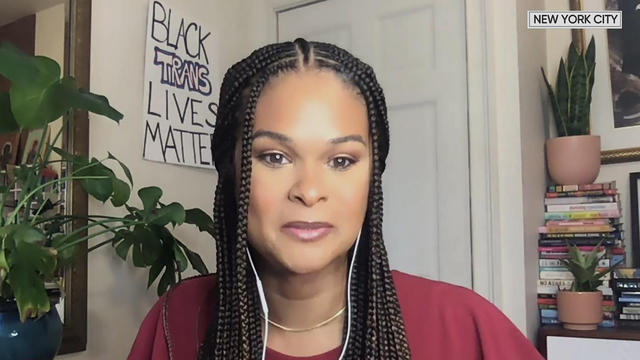Activists are criticizing the Arkansas Republican-controlled state legislature after it overrode Governor Asa Hutchinson’s veto on a law that makes it a criminal offense for medical professionals to provide transgender minors with transition treatments such as hormone blockers or gender-affirming surgeries. The move comes a day after Hutchinson, a Republican, called the legislation a “vast government overreach.”
The historic, but controversial law, which also prohibits physicians from referring minors to other professionals for such care, comes amid a sweeping number of anti-trans bills in states, including banning transgender student-athletes from competing in sports aligned with their gender identity. Activist and cultural organizer Raquel Willis said these pieces of legislation are demoralizing.
“I think that we have to really have a conversation around the problem with trying to police people’s bodies,” Willis told CBSN. “This is not only going to affect trans youth but everyone because in some states these pieces of legislation build registries to police the bodies of all athletes.”
According to the American Civil Liberties Union, the decision by the Arkansas legislature ignores the advice of dozens of local doctors and national medical experts as well as the lived experiences of trans youth and their parents. The ACLU has since said it will challenge the law in court.
Many critics and lawmakers argue that minors are not capable of making medical decisions about their gender identity. But Willis told CBSN misinformation and disinformation affects the issue, and a lot of the conversation around the type of healthcare that transgender people have access to is often sensationalized and focused on things like gender-affirming surgeries such as gender reassignment.
“A lot of the medical transition is not necessarily about surgery. It could be about getting access to hormonal treatment or access to puberty blockers, which is a thing, particularly for trans youth. There are so many other types of services,” says Willis. “There’s so much ignorance out there about the trans experience and if a trans youth and their family finally get support from a medical professional, that is a beautiful thing — and what we are seeing is a lot of these folks who have access to that healthcare will now have it stripped away.”
Affirming gender identity among transgender and nonbinary youth is consistently associated with lower rates of suicide attempts. According to a study by The Trevor Project, a nonprofit devoted to suicide prevention in the LGBT community, transgender and nonbinary youth with access to binders, shapewear and gender-affirming clothing reported attempting suicide in the past year at lower rates compared with transgender and nonbinary youth who did not have access.
“Just a few years ago, the big threat was that trans people shouldn’t be in restrooms,” says Willis, referring to a spate of state efforts that sought to limit bathroom access to sex assigned at birth. “Now they’re trying to make it about trans youth.”
Arkansas’ law, also known as the Save Adolescents from Experimentation, or SAFE, Act will go into effect 90 days after the General Assembly recesses, which is scheduled for April 30.


































